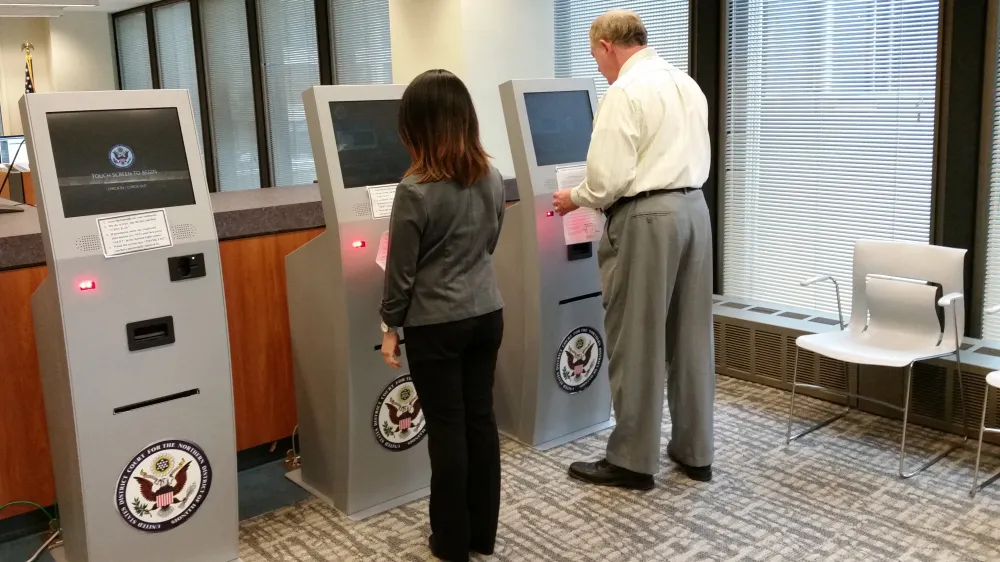
Jury Clerk Jessica Gomez and Jury Administrator Daniel Fitzsimmons, of the Northern District of Illinois, demonstrate the check-in process on new jury kiosks being deployed in the federal courts.
In a concerted effort to make it easier for people to serve as jurors, the federal Judiciary is embracing technologies aimed at reducing wait times, paperwork, and trips to the courthouse.
“We want jurors to have positive experiences with the courts,” said Paul Lombardi, jury supervisor for the U.S. District Court for the Eastern District of Pennsylvania. “We recognize that while jury service is an important civic duty, it can be seen as an inconvenience, which is why we have implemented systems to foster better communication between the jurors and the court.”
One of the major innovations in recent years was adoption Judiciary-wide of an electronic records management system, which makes it easier to form jury pools without requiring people to trek to their local courthouses. The Jury Management System stores jury questionnaire information and runs a computer algorithm to create a random pool of qualified people. Prior to the electronic system, the selection process was paper-based, and court staff would manually process questionnaire data and use a jury wheel, similar to a bingo wheel, to form jury pools.
“Prospective jurors used to have to come to the courthouse just to find out if their number would be drawn from the jury wheel,” said Kristine Porter, jury administrator for the District of Utah. “The Jury Management System allows us to save prospective jurors valuable time by only summoning those people who have been selected for (the next round of) jury service.”
Another innovation, the web-based eJuror system, allows prospective jurors to complete jury questionnaires online rather than filling out paper forms and mailing them to the court. Both prospective jurors and those chosen for pools can check their reporting status anytime online rather than calling the court or making a special trip to the courthouse. The next version of eJuror will be accessible on devices like iPhones and tablets.
“We’ve had a great return rate for jury questionnaires since implementing eJuror,” Porter said. “Jurors really appreciate the ability to fill out questionnaires electronically and check their reporting status whenever they please.”
In place in most of the 94 federal court districts is the Integrated Voice Response system, an automated messaging system that can send email alerts, phone calls, and text messages reminding jurors to fill out questionnaires or to show up for jury service. Before the automated messaging system, jurors were usually contacted by phone by court staff, which meant wait times or missed voicemail messages. Both prospective jurors and those chosen for jury pools can also call the automated system to immediately check their reporting status and receive reminders.
“We can now quickly notify jurors of last-minute cancellations, reducing the risk of jurors driving all the way to the courthouse to find out their service is no longer needed,” said Jeff Cargile, jury administrator for the District of South Carolina. “The system does a great job at keeping jurors informed, especially in last-minute situations where it’s impossible for three court staff members to make hundreds of phone calls hours before jurors are expected to report to the courthouse.”
A new jury kiosk system aimed at automating and speeding up juror check-ins was recently tested as part of a pilot program in four district courts.
Kiosks are typically located in jury assembly rooms and allow prospective jurors to quickly check in by scanning their summons letters. The kiosks also prompt them to answer questions left incomplete in the questionnaires. Information entered into the kiosk is automatically uploaded into the Jury Management System, helping to keep contact information up-to-date and ensuring that notifications via eJuror and the automated messaging system are sent to the correct email addresses and phone numbers.
The kiosk system relieves court staff of manually checking all jurors into the Jury Management System. Court staff will still need to conduct manual check-ins for reporting jurors with personal emergencies or travel issues.
“Kiosks are a huge timesaver for both jurors and court staff,” said Daniel Fitzsimmons, jury administrator for the Northern District of Illinois. “Jurors like that they aren’t stuck waiting in long lines and we are always standing by ready to assist if there is a problem with the kiosk.”
For those who prefer the traditional experience, courts still offer the option of filling out paper questionnaires, speaking to actual people on the phone, and checking in manually.
“We find that more and more, people are gravitating to these new automated and web-based systems,” said Pat Shubird, district systems manager for the Southern District of Alabama. “I’ve had jurors ask me if we have a smart phone application for all these services, so there are always strides to be made in jury automation.”
Subscribe to News Updates
Subscribe to be notified when the news section is updated.
